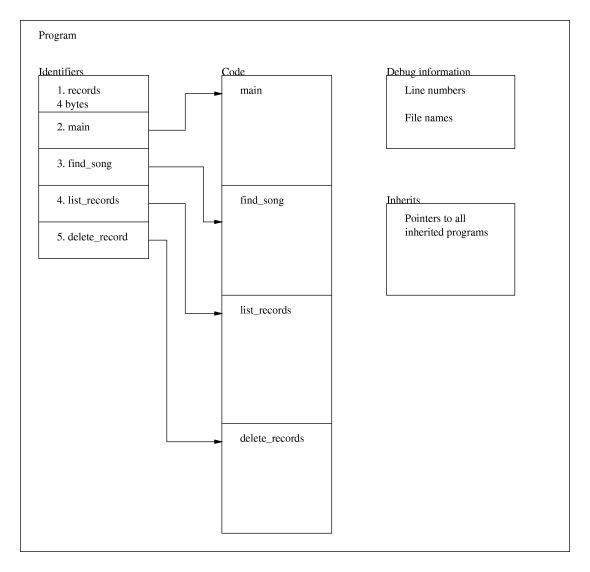
fig 4.4

You can also use the cast operator like this:program p = compile_file("hello_world.pike");
This will also load the program hello_world.pike, the only difference is that it will cache the result so that next time you do (program)"hello_world" you will receive the _same_ program. If you call compile_file("hello_world.pike") repeatedly you will get a new program each time.program p = (program) "hello_world";
There is also a way to write programs inside programs with the help of the class keyword:
The class keyword can be written as a separate entity outside of all functions, but it is also an expression which returns the program written between the brackets. The class_name is optional. If used you can later refer to that program by the name class_name. This is very similar to how classes are written in C++ and can be used in much the same way. It can also be used to create structs (or records if you program Pascal). Let's look at an example:class class_name {
inherits, variables and functions
}
This could be a small part of a better record register program. It is not a complete executable program in itself. In this example we create a program called record which has three identifiers. In add_empty_record a new object is created by calling record. This is called cloning and it allocates space to store the variables defined in the class record. Show_record takes one of the records created in add_empty_record and shows the contents of it. As you can see, the arrow operator is used to access the data allocated in add_empty_record. If you do not understand this section I suggest you go on and read the next section about objects and then come back and read this section again.class record {
string title;
string artist;
array(string) songs;
}
array(record) records = ({});
void add_empty_record()
{
records+=({ record() });
}
void show_record(record rec)
{
write("Record name: "+rec->title+"\n");
write("Artist: "+rec->artist+"\n");
write("Songs:\n");
foreach(rec->songs, string song)
write(" "+song+"\n");
}
compile_file simply reads the file given as argument, compiles it and returns the resulting program. compile_string instead compiles whatever is in the string p. The second argument, filename, is only used in debug printouts when an error occurs in the newly made program. Both compile_file and compile_string calls compile to actually compile the string after calling cpp on it.program compile(string p);
program compile_file(string filename);
program compile_string(string p, string filename);
The following operators and functions are important: